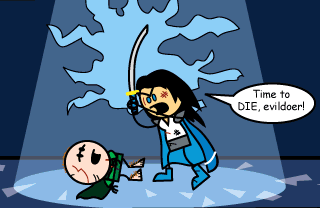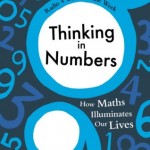
(Order of the Stick/Rich Burlew)
In Sunday’s Book Review, the NYT asked authors whether virtuous characters can ever be interesting. The first author came down firmly on the side of the villains, saying, “No one has ever preferred Amelia to Becky in “Vanity Fair,” or Melanie to Scarlett in “Gone With the Wind.” But Alice Gregory, the second writer, said you can’t do better than a good person if what you want is conflict. The trick is remembering that the antagonist is the world.
But as anyone who has earnestly attempted it will admit, being good is to feel far more at odds with the world than being bad does. It is the cumulation of calculated social compromises, purposeful acts of communion, and meticulous emotional arithmetic. Commonplace wickedness, meanwhile, is seldom the result of anything more devious than inattention to the feelings and realities of other people. Living virtuously is hard. It takes generative intellectual work that is far more interesting than the defensiveness of “being bad.” I would rather consider the challenges that go into a consciously lived life than the inevitably hurtful products of a cruel one.<
A truly radical 21st-century novelist wouldn’t ask us to see ourselves in made-up villains, and then, hopefully, revise our opinions of the real ones in our own lives. Rather, they would ask us to see the arduous and often acrobatic effort that goes into living a life of common decency. They would coerce us into believing that virtue is interesting and fun to think about and far more dazzling to encounter than malevolence.
I’m with Gregory. And if you’re looking for a Good character who actually makes for a good character, try Jean Valjean. As I wrote, responding to a critic, in “But Aren’t Saints Dreadfully Dull?”
I think Denby is thinking of a Saint as a character class. The distinction is baked into the character at the beginning the story, and the constraints of that choice limit and define the roles the character can play in the story. And Denby thinks Fantine and Valjean are boring ol’ paladins. Totally committed to the Good, incapable of making a selfish choice, they’re what Javert only thinks he is. And no one really wants a paladin for a protagonist; since the fun of stories is getting to watch characters choose, maybe err, and rechoose. Paladins are more like wind-up creatures than people; they just keep tick-stepping in the right direction.
Being Good isn’t a matter of choosing once and then proceeding on autopilot. It’s a lot of small, creative acts of resistance. It’s a lot of doing small, boring kindnesses that can secretly be a little thrilling because they don’t happen by default — they’re a matter of choosing or of building up habits of thought and action until caritas does actually wind up feeling natural.
When I want a reminder of how exhiliarating “boring” goodness is, I like to flip to this passage in G.K. Chesterton’s The Man Who Was Thursday:
“Nonsense!” said Gregory, who was very rational when anyone else attempted paradox. “Why do all the clerks and navvies in the railway trains look so sad and tired, so very sad and tired? I will tell you. It is because they know that the train is going right. It is because they know that whatever place they have taken a ticket for that place they will reach. It is because after they have passed Sloane Square they know that the next station must be Victoria, and nothing but Victoria. Oh, their wild rapture! oh, their eyes like stars and their souls again in Eden, if the next station were unaccountably Baker Street!”
“It is you who are unpoetical,” replied the poet Syme. “If what you say of clerks is true, they can only be as prosaic as your poetry. The rare, strange thing is to hit the mark; the gross, obvious thing is to miss it. We feel it is epical when man with one wild arrow strikes a distant bird. Is it not also epical when man with one wild engine strikes a distant station? Chaos is dull; because in chaos the train might indeed go anywhere, to Baker Street or to Bagdad. But man is a magician, and his whole magic is in this, that he does say Victoria, and lo! it is Victoria. No, take your books of mere poetry and prose; let me read a time table, with tears of pride. Take your Byron, who commemorates the defeats of man; give me Bradshaw, who commemorates his victories. Give me Bradshaw, I say!”
“Must you go?” inquired Gregory sarcastically.
“I tell you,” went on Syme with passion, “that every time a train comes in I feel that it has broken past batteries of besiegers, and that man has won a battle against chaos. You say contemptuously that when one has left Sloane Square one must come to Victoria. I say that one might do a thousand things instead, and that whenever I really come there I have the sense of hairbreadth escape. And when I hear the guard shout out the word ‘Victoria,’ it is not an unmeaning word. It is to me the cry of a herald announcing conquest. It is to me indeed ‘Victoria’; it is the victory of Adam.”
In books, and in ordinary life, it’s nice to pause after turning away from anger, or remembering to write a kind note, or having someone over for dinner and quietly pump my fist and whisper, “Victoria!“












